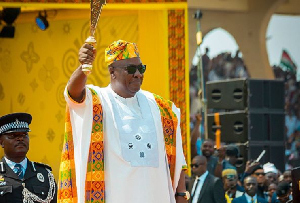First Deputy Governor, of the Bank of Ghana (BoG), Dr Maxwell Opoku-Afari, has recounted how the coronavirus pandemic negatively impacted on the banking sector of the local economy.
Prior to the pandemic, he said at the 5th CEO’s Summit on Monday, May 17, the implementation of sound macroeconomic policies between 2017 and 2019, significantly improved the macro fundamentals of the Ghanaian economy.
Broadly, he said, the economy was characterized by strong GDP growth, averaging 7 percent over the period, and inflation declined to single-digits and within the Bank’s medium-term target of 8±2 percent. The unwinding of the large macro imbalances resulted in lower fiscal and current account deficits, accompanied by three consecutive years of trade surpluses.
The country’s reserve buffers also improved, providing some anchor to exchange rate stability. Public debt management policies were strengthened, and the debt profile restructured to lessen the repayment burden. This created some fiscal space to support the implementation of growth-enhancing policy initiatives by government. Alongside these, the Bank implemented comprehensive financial sector reforms which resulted in well-capitalised, strong, and liquid banking sector, well-positioned to support the country’s growth and development agenda.
With this background, the policy direction at the start of 2020 was to further consolidate the achievements and move the country to the next stage of the development agenda.
Consequently, Dr Opoku-Afari added, prudent, and complementary monetary and fiscal policies were programmed. First, monetary policy was to steer inflation further down to low and stable levels. For the financial sector, the successful completion of the clean-up had improved prudential regulations, strengthened efficiency, and refocused the banking sector to its intermediary role to finance the growth needs of the country, he added.
“Second, fiscal policy was geared towards aggressive tax reforms and pro-growth initiatives in the agriculture and industrial sectors to expand the productive capacity of the economy. And last but not the least, other structural reforms were initiated to increase efficiency of the public sector through digitisation and by so doing, formalize the economy and improve the ease of doing business,” he said.
This was where the Ghanaian economy was at the start of 2020, until March, when Covid disrupted the rather very strong economic outlook, he said.
The severity of the pandemic prompted restricted movements, lockdowns, and border closures to halt its spread. These resulted in a slump in economic activity and almost wiped off the gains achieved over the three-years prior. For instance, GDP growth slumped to 0.4 percent in 2020 (the lowest in decades) compared with the pre-Covid projection of 6.8 percent. Inflation spiked from single to double digits, peaked at 11.4 percent in July 2020, driven mainly by food price pressures due to the lockdown measures, before easing to 10.4 percent in December 2020.
The disruptions in global supply chains adversely impacted trade activity. Businesses faced supply constraints amid weak consumer demand which set off cost-cutting measures including reduction in working hours, layoffs, and wage cutbacks, worsening the unemployment situation.
Fiscal pressures from the health sector and the social consequences of the restricted movements mounted and disrupted the fiscal consolidation path. As a result, additional expenditures related to the Covid-19 coupled with revenue shortfalls on account of the economic slowdown and sharp drop in oil revenues, elevated the 2020 fiscal deficit to 11.7 percent of GDP, from a pre-Covid projection of 4.7 percent of GDP. These unanticipated fiscal developments also pushed up the stock of public debt to 74.6 percent of GDP at the end of 2020 from 62.4 percent of GDP recorded in 2019.
Mr. Chairman, the combined demand and supply shock from Covid required decisive and swift fiscal, monetary, and macroprudential policy responses to moderate the economic damage. The policy responses included fiscal stimulus packages, including several social intervention measures.
To complement these, the Bank lowered the monetary policy rate by 150 basis points and implemented other macro-prudential measures to ensure adequate liquidity within the financial sector during the pandemic.
The push for financial digitization was intensified with the removal of transfer costs (for minimum transactions) on mobile networks, and the Universal Quick Response Code for payments across banks, Telco’s, fintechs and merchants was implemented to promote e-commerce and e-transactions.
The economic costs of the Covid-shock, in terms of foregone growth and its implications for employment and poverty reduction, infrastructural development, and economic expansion, are enormous and would require carefully crafted strategies to reset the economic agenda back to stability and growth.
Business News of Monday, 17 May 2021
Source: 3news.com

















